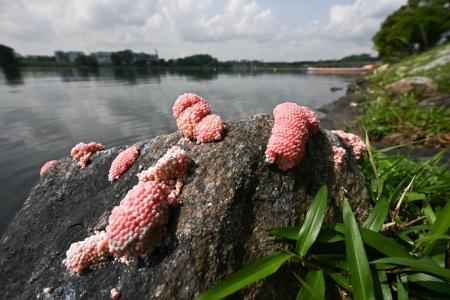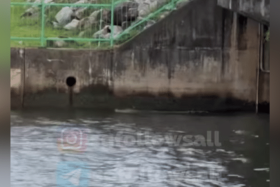Snail eggs removed from Lower Seletar Reservoir
The eggs of an invasive snail species recently spotted at Lower Seletar Reservoir have been removed by national water agency PUB.
The board saw an increase of golden apple snail eggs at the reservoir on Oct 4 during its weekly maintenance of the water body, and removed them, the PUB and the National Parks Board said in a joint statement on Oct 10.
These snails are commonly seen in reservoirs, ponds and ditches here and their eggs are removed weekly by PUB, the statement added. The agency has also increased the frequency of the removals, without elaborating.
Golden apple snail eggs do not impact water quality, though research has shown that they contain toxins that protect them against predators and can pose a risk to humans if eaten or touched with bare hands.
Also, the golden apple snail competes with the apple snail, which is rare locally, for food and shelter, the statement said.
“We would like to remind everyone that the release of animals into our catchment and waterways can upset the aquatic ecosystem of our waters.”
Researcher Tan Siong Kiat, the author of A Guide to Snails and Other Non-marine Molluscs of Singapore, said golden apple snail eggs are not often noticed here, and very little is known about their effects on the local ecosystem.
Studies elsewhere have shown these snails can affect the diversity of aquatic plants and change the composition of phytoplankton, or microscopic marine algae.
Mr Tan added that the golden apple snails help control the populations of green algae and pond scum.
He said it is impossible to remove the snail locally, and added: “It is probably more practical to target their pink egg masses which are always laid above the water surface and relatively easy to locate and destroy.”
Get The New Paper on your phone with the free TNP app. Download from the Apple App Store or Google Play Store now


